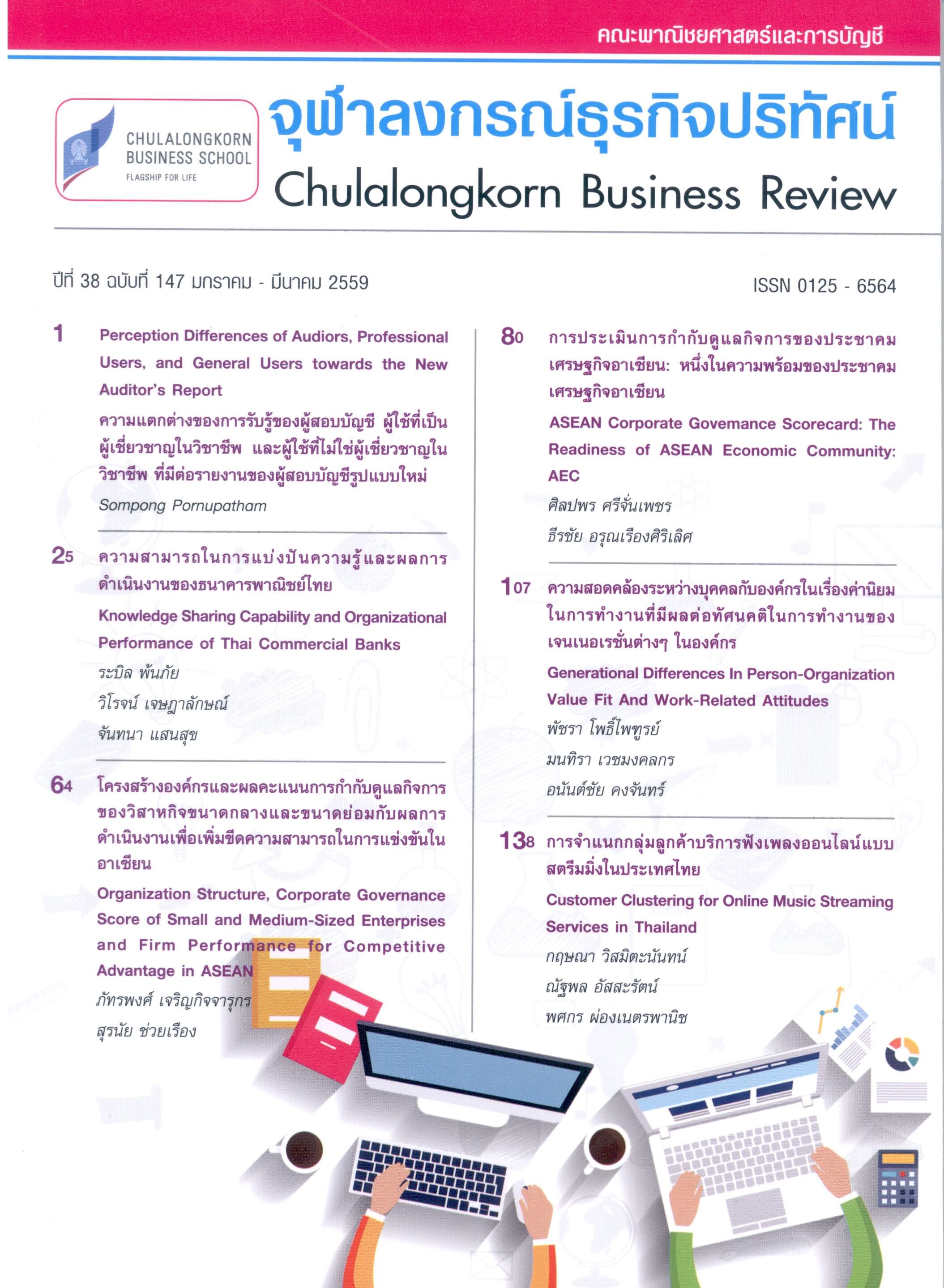ความสอดคล้องระหว่างบุคคลกับองค์กรในเรื่องค่านิยมในการทำงานที่มีผลต่อทัศนคติในการทำงานของเจนเนอเรชั่นต่างๆ ในองค์กร
Main Article Content
Abstract
บทคัดย่อ
ความสอดคล้องระหว่างบุคคลกับองค์กรในเรื่องค่านิยมในการทำงานได้รับการศึกษาอย่างแพร่หลายในประเทศแถบซีกโลกตะวันตกและพบว่าเป็นปัจจัยหนึ่งที่ช่วยให้พนักงานมีความผูกพันต่อองค์กร (Organizational commitment) และมีความตั้งใจในการคงการเป็นสมาชิกภาพขององค์กร (Intention to stay) มากขึ้น (Kristof-Brown, Zimmerman, & Johnson, 2005; Boon, Den Hartog, Boselie, & Paauwe, 2011) อย่างไรก็ตาม ในอดีตที่ผ่านมามีงานวิจัยน้อยมากที่ศึกษาความสัมพันธ์ดังกล่าวโดยเปรียบเทียบตามกลุ่มเจนเนอเรชั่น จึงเป็นที่มาของงานวิจัยนี้ ซึ่งศึกษาโดยแบ่งกลุ่มตัวอย่างเป็น 2 กลุ่ม คือ เจนเนอเรชั่นวาย 210 คน และเจนเนอเรชั่นเอ็กซ์รวมกับเบบี้บูมเมอร์สอีก 179 คน ผลการวิจัยพบว่า ชาวไทยแต่ละเจนเนอเรชั่นมีความเห็นเรื่องความสอดคล้องระหว่างบุคคลกับองค์กรแตกต่างกัน โดยเจนเนอเรชั่นวายให้ความสำคัญกับความสอดคล้องด้านผลตอบแทนโดยรวม (Total rewards fit) ในขณะที่เจนเนอเรชั่นเอ็กซ์และเบบี้บูมเมอร์สให้ความสำคัญกับความสอดคล้องด้านสภาพแวดล้อมในการทำงาน (Work environment fit) สำหรับความสอดคล้องในด้านการเรียนรู้และพัฒนา (Learning and growth fit) เป็นสิ่งที่คนทุกวัยให้ความสำคัญเหมือนกัน และความสอดคล้องในแต่ละด้านนี้ส่งผลต่อความผูกพันต่อองค์กรและการดำรงสมาชิกภาพขององค์กร งานวิจัยนี้ยืนยันถึงความสำคัญของความสอดคล้องระหว่างบุคคลกับองค์กรในเรื่องค่านิยมในการทำงานในกลุ่มคนต่างเจนเนอเรชั่น ดังนั้น องค์กรควรกำหนดนโยบายด้านการบริหารทรัพยากรบุคคลที่แตกต่างกัน เพื่อดูแลพนักงานในแต่ละเจนเนอเรชั่นให้เหมาะสมกับความต้องการมากขึ้น ซึ่งจะช่วยสร้างความผูกพันต่อองค์กร ทำให้พนักงานรู้สึกอยากทำงานกับองค์กรนานขึ้น และช่วยให้องค์กรพัฒนาได้อย่างต่อเนื่องและมีความสามารถในการแข่งขันอย่างยั่งยืนในโลกธุรกิจปัจจุบัน
คำสำคัญ: ความสอดคล้องระหว่างบุคคลกับองค์กร เจนเนอเรชั่น ประเทศไทย ความผูกพันต่อองค์กร ค่านิยมในการทำงาน การลาออก
Abstract
Person-organization (P-O) values fit has been extensively studied in the West reporting its implication on enhanced employee commitment and intention to stay (Kristof-Brown et al., 2005, Boon et al., 2011). Little P-O values fit research, however has focused on P-O values fit across generations and their influences on outcomes. Adopting P-O values fit theory, our study explores the congruence of individual and organizational work values and its influence on employee commitment and intention to stay of different generational cohorts, i.e. Generation Y (n = 210) and Generation X and Baby boomers (n = 179) in Thai workforce. Results show that fit in rewards, work environment and learning and growth influence commitment and intention to stay: Generation Y are more salient to fit in rewards and outcomes relationships while Generation X and Baby boomers are more salient to fit in work environment and outcomes relations. Both cohorts share common value on learning and growth reporting fit in this aspect being associated with their level of commitment and intention to stay. This study contributes to the P-O values fit literature by showing that generations influence variance in values fit and outcomes relationships. This suggests that organizations should be selective on people policies for different generation workforce so as to enhance the desired outcomes for sustained organizational competitive advantage.
Keywords: person-organization fit, generation, Thailand, organizational commitment, work values, employee turnover
Article Details
Opinions and discussions in papers published by the Creative Business and Sustainability Journal (CBSJ) are deemed as personal opinions and the responsibility of the writers. They are not the opinions or responsibility of the Chulalongkorn Business School of Chulalongkorn University.
Papers, content, information etc. appearing in the Journal are deemed to be the copyright property of the Chulalongkorn Business School of Chulalongkorn University. Anybody or any organization that wishes to publish any part of them or use them in any way must obtain written permission from the Chulalongkorn Business School, Chulalongkorn University.


